This THM approved sprouted bread dough is mixed and risen on the dough cycle in the bread machine and then baked in the oven….SO easy and soft using this simple method (The dough can also be made without a bread machine in a traditional mixer or by hand if you prefer-I have pictures and details for both methods below)! My bread machine method is my shortcut secret to making bread or rolls ridiculously QUICKLY and EASILY! Read more below to find out all the details! If you want to make amazingly soft and fluffy sprouted rolls, you may also want to check out my recipe for Easy Fluffy Sprouted Rolls HERE.
Attention Bread Bakers!
Check out our
NEW
Sprouted bread-making video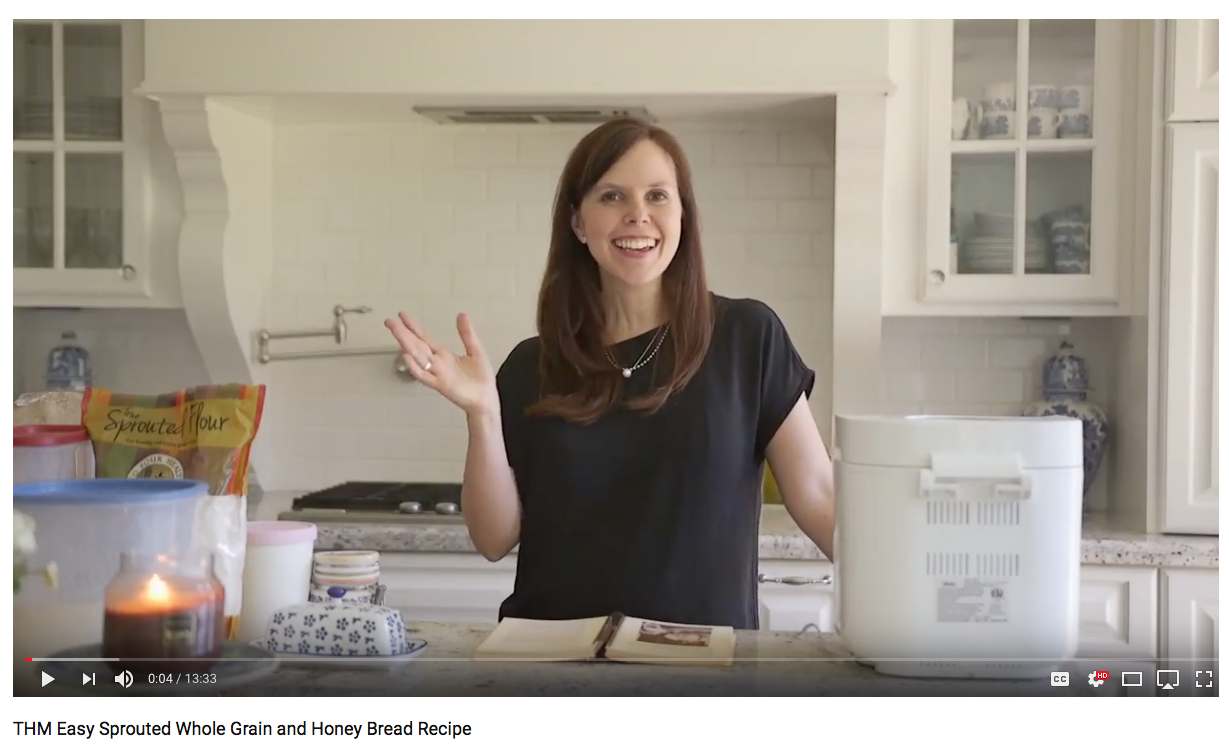
on YouTube to help you see exactly what I do when I make my bread and why I use sprouted flour!
I admit it…I like bread A LOT! I grew up as a “Whole Grain Jane”. I was literally making bread since I was a little girl (See the picture below of me with my older sister. This picture was taken and published when my mom wrote a whole foods cook book many years ago when I was three years old). Growing up, I made about 8 loaves every week or so for my family in our Bosch mixer.
Before I had children, I used to sell my bread and ship it to people. To all my friends and family, I am known for making homemade breads and rolls. When I published a cookbook a few years ago (currently out of print); I included a whole section of breads. However, I knew little about the need for using sprouted flours and about the effects of slathering my breads with lots of butter and the effect that could have on the waistline for people that are struggling with their weight (I love me some buttah!). For people that are not struggling with their weight, such as some children, and some pregnant and nursing mothers, etc…combining fats and carbohydrates is often helpful to maintain a healthy weight.
When we began eating the THM way, we bought a popular brand of commercially produced sprouted bread. The commercial bread is a great product, but it is kind of tough and hard, so to try and soften it I would make our sandwiches into Panini’s, so that the bread would warm and be a little softer. However, try as it might, the commercial bread never could match up to my homemade whole grain bread. I really missed my old bread recipe that I had been making for years. It was soft and could be enjoyed without being warmed. I was not intimidated by making bread, but I was intimidated at the thought of sprouting my own grain. I own a grain grinder so grinding the wheat was not an issue for me, just the process of sprouting and dehydrating the wheat to prepare it to be ground, so I never pursued that option.
One day, I happened upon a post by one of the THM admins and she mentioned that she made her own sprouted bread. I was intrigued and asked for more details. That is when I learned that I could buy pre-ground sprouted flour! Oh, happy day! Why had no one ever told me about this sooner? Thus, began my journey to re-make my old beloved bread recipe into a THM-ified version so that it could be considered on plan.
Sprouted grains…why bother? What’s the big deal? What I have learned recently about sprouted flour is truly amazing! I encourage you to take a few moments to read the amazing benefits of sprouted grains as opposed to un-sprouted grains here:
http://essentialeating.com/blogs/sprouted-flour/5713582-how-does-sprouted-flour-taste#article-top
http://essentialeating.com/blogs/sprouted-flour/5713522-the-beauty-of-sprouted-flour#article-top
http://essentialeating.com/blogs/sprouted-flour/5713692-digestible-grains-and-diabetes#article-top
In a nutshell, once grains are sprouted they become more like a vegetable to your body and thus they do not spike your blood sugar like traditional un-sprouted grains, hence they are very glycemic and diabetic friendly. The sprouted grains allow for better absorption of vitamins and minerals, they taste better and produce a better-textured food product. Who knew that once grains are sprouted your body reacts to them more like a vegetable??? Now I can eat my “vegetables” through my bread…um, yes, please! Pretty cool, huh!?!!?
I could not buy the sprouted flour locally, but my sister-in-law was able to find it for me at a local grocery store called Sprouts in her city. The brand she found for me to use is called “One Degree”. She bought me one 5lb. bag of the organic sprouted whole wheat flour ($6.99). I can make about 3 batches (6 loaves) from each 5lb. bag of flour, so I figured up that I would only be spending about $1.25 per loaf of bread. Compared to the $4.00 plus price tag per loaf of the commercial bread that I was buying, I was thrilled to have an option that was so much less costly. Not only is the homemade sprouted bread less costly, but it is SO SOFT and tasty! After making it for my family, they all agreed that they like the new sprouted bread better than my old bread because the texture and flavor are superior.
NEW & IMPROVED RECIPE DETAILS-
Maybe you are wondering why I needed a “new and improved” version of my bread recipe if the original recipe was so great? You see, I began using One Degree sprouted flour because that is what was available to me 3 years ago when I first wrote my original bread post. It came in lovely green bags and worked great…until they changed their packaging…I contacted the company and they say it is the same product inside the bags, but alas, my bread and the bread of my reader’s began to have rising issues. I was puzzled as to the cause of why, all of a sudden, I began having issues with my bread rising when it had risen well for so long previous to that. It was SUPER frustrating that what had once worked so well, was now failing me and my readers. I decided to take on the challenge and figure out this bread dilemma!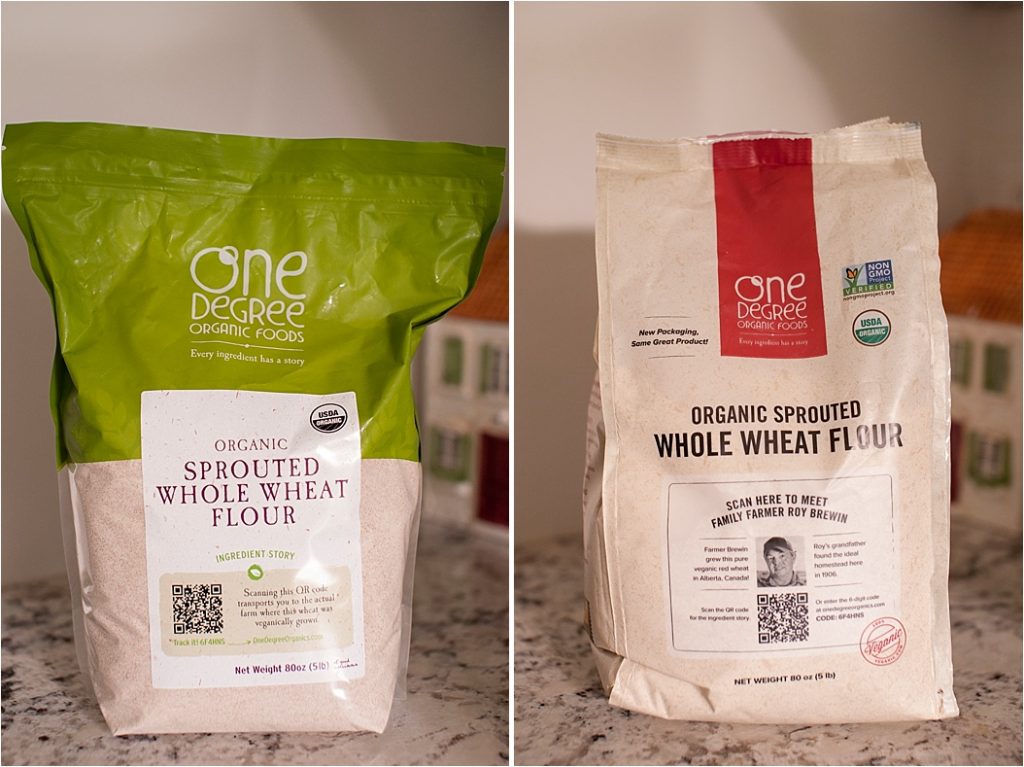
Original green packaging & New red packaging
I tried making the bread with all sprouted spelt flour, but the spelt had trouble rising well. Then, I tried making the bread with all sprouted whole wheat flour. It produced a better loaf than when I made it with all sprouted spelt, but it still wasn’t rising like I had hoped. Next, I tried many combinations of the two sprouted flours and yet, I wasn’t consistently getting the results of fluffy bread like I once was before the packaging change. After I exhausted my ideas of different sprouted flour combinations I decided maybe I needed to try a different yeast and that didn’t do the trick either. More frustration…
While I was at a convention this summer, there was a booth that sold homemade bread products, so I stopped by there to chat with them to see if they had any ideas I could try. They were not using sprouted flour, so they couldn’t help me on that front, but they did have two ingredients that caught my eye. They carried a special yeast that I grew up using when I made bread as a young girl. It is called SAF instant yeast and you can get it on Amazon HERE.
Then, I decided to also try a product called vital wheat gluten. The vital wheat gluten is supposed to really help whole grain breads to rise, so I thought I’d give it a shot and see what happened. I had used a product called “dough enhancer” in my bread recipe when I was growing up, but I opted for the vital wheat gluten instead of the dough enhancer because the dough enhancer had some ingredients in it that I was trying to avoid. I use the Nutrimill brand of Vital Wheat Gluten that you can buy HERE for a great price or I found this brand on Amazon that has good reviews and come in a larger package.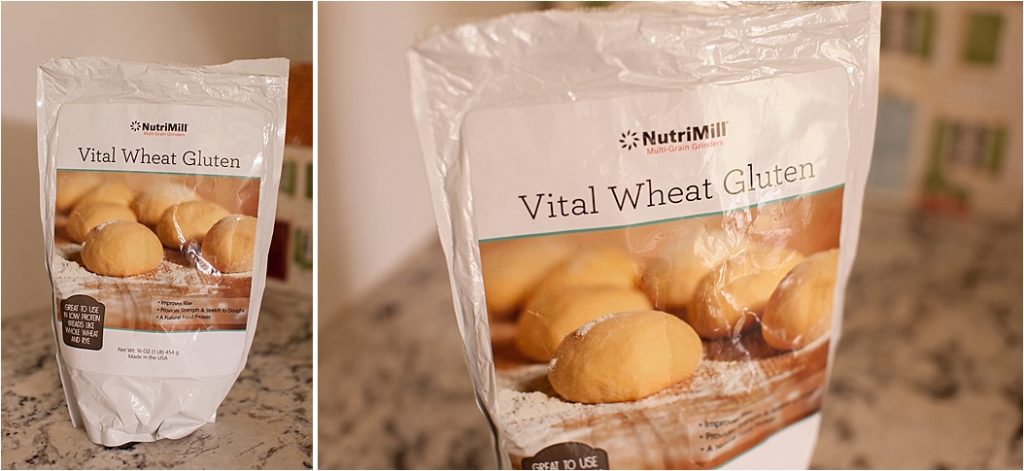
Armed with my new ingredients, I came home and was eager to see if they made a difference. Lo and behold, they did make a difference! My bread was better than it had been in a long time, but it still wasn’t where I hoped it would be so I kept tweaking. What I finally came to realize is that the dough needed more “stability” to rise better and the sprouted flours were more “delicate”, so to speak. I decided to do the “unthinkable” (in THM circles) and add some ingredients that are rarely used in the THM plan. Those ingredients that I added were a tad of regular whole wheat flour and a little unbleached white flour to give the dough the needed stability in order to rise well. My thinking for being ok with adding minimal amounts of these ingredients is that there are some other on plan breads, pastas, pitas, low carb tortillas and other products that also use minimal amounts of these flours and are still considered on plan. Don’t worry, I ran the amounts that I added to my new bread recipe by a THM admin for approval before bringing you this revised recipe. Each recipe makes two loaves and each loaf makes about 16 slices, so each slice roughly has one teaspoon of white flour and 1/2 teaspoon of un-sprouted whole wheat flour. I am completely fine with this minuscule amount, but if you are staunchly against eating tiny amounts of these other flours, then, by all means, just use all sprouted flour and your loaf will still turn out, but it will likely not be as high and soft and fluffy as it could be if you choose not to add the additional flours.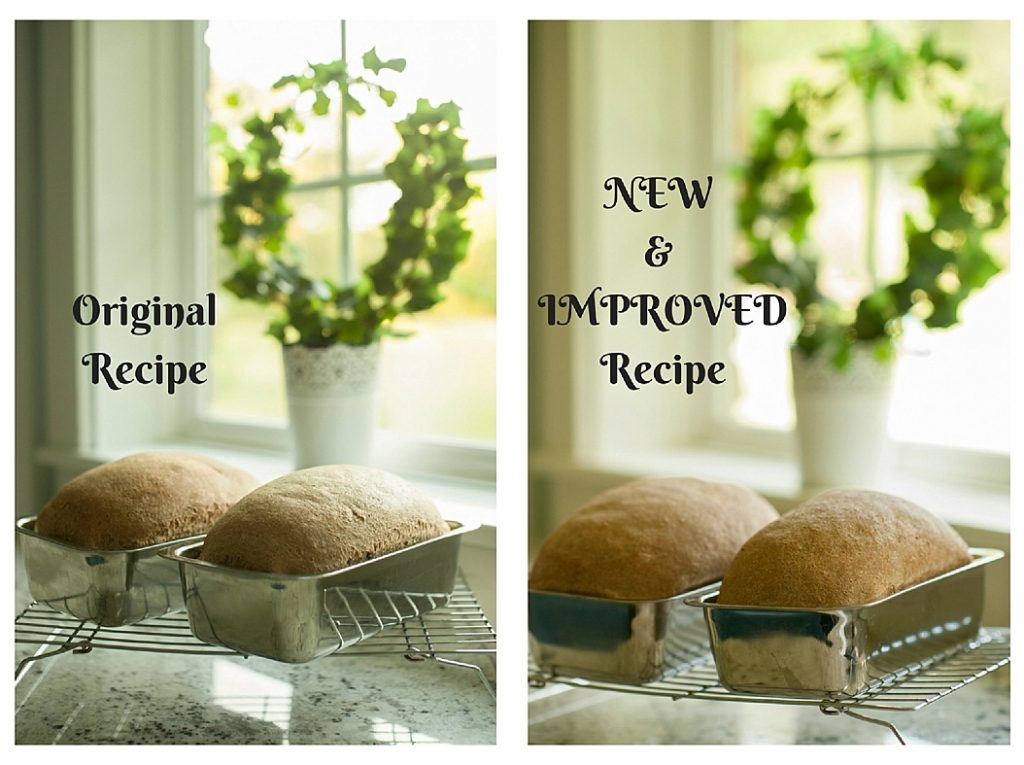
Notice the difference in the two pictures above.
The height of the bread from the new recipe and the smoothness of the sides really shows the difference in the two recipes.
FINALLY, after months of trouble-shooting to get a non-dense, fluffy loaf of bread, I had success…sweet blissful success!!! I was so enamored with the texture and airiness of the new bread that I texted pictures of the new loaves to my friends and family so they could “celebrate victory” with me! I hope that you will try this new recipe out and let me know what you think!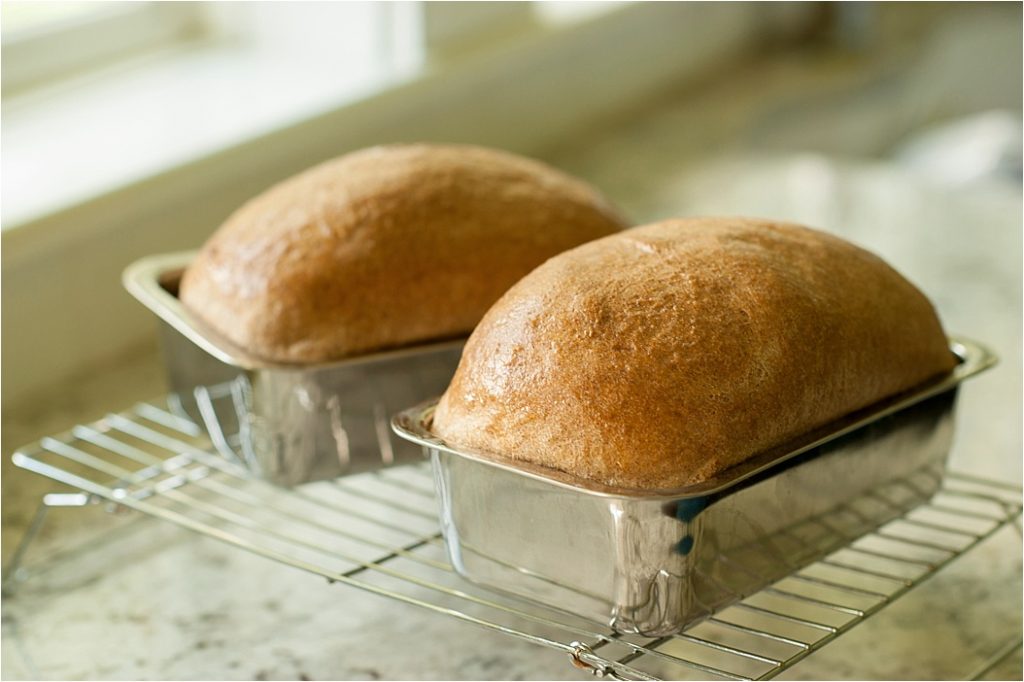
I have made my new and improved recipe many times since this summer, and it has turned out wonderfully. This sprouted bread dough is quite versatile and can be made into baguettes, rolls, sandwich buns, pizza dough, etc…
It is possible to sprout your own flour, but so, far, everyone that I have heard from that has made the bread with their own sprouted flour has reported that is has not risen well as using a commercially sprouted flour. Also, I have a friend that ordered organic sprouted flour from a co-op and she brought her bread that she made using my recipe to a THM gathering that I hosted. I had also made my bread for the gathering using the “One Degree” brand and the difference was drastic-my loaf was tall and light and fluffy and her loaf was shorter and denser. She was thrilled with how her bread turned out until she saw mine, so we both learned that night that all sprouted flours are not created equal. If you have successfully used a brand of sprouted flour with my bread recipe that you have liked please send me a message or comment below!
**NOTE**
Update to the New and Improved bread recipe flour options-
I recently found a new brand of sprouted whole wheat flour that I can use if I want to make my recipe with ALL sprouted flour as opposed to mixing in the other flours that are not as good for you. I have fallen in love with using this new brand because I have had nothing but success when using it. The difference is that it is a sprouted flour made with white wheat berries, as opposed to the more commonly used red wheat berries. The brand that uses the white wheat is called “To Your Health” and can be bought HERE. I like this product better for baking because when I used white wheat to make my bread when I was growing up I always had better success with texture and rise than when I used the red wheat flour. Up until now, I was not aware of a place to buy Sprouted White Wheat, so I’m glad to have this better option.
The “To Your Health” brand is a bit more costly than the One Degree brand of sprouted flour that I’ve used for the last 3 years but, it is so worth it because it produces a higher rise and fluffier product than the red wheat flour, I have been successful at using all sprouted flour in this recipe while still achieving a superior rise and soft texture. When making my bread recipe with the white whole wheat “To Your Health” brand of flour, the price only comes out to about $2.75 per loaf of bread or per dozen rolls (this recipe makes approximately 2 dozen rolls depending on the size of dough balls you form), which is still a great price! If you wish to save money, you can always make dough out of the mixture of flours as I show in the recipe below.
RECIPE NOTE–If you make my bread recipe with ALL the “To Your Health” sprouted flour then you will want to simply increase your water by 2 Tablespoons and substitute the white flour and the un-sprouted whole wheat flour with the sprouted (you will use a total of 4 2/3 cups of “To Your Health” white whole wheat flour).
This bread recipe can be made the old fashioned way by hand or in a stand mixer such as a Bosch or a Kitchen Aid with a dough hook. Even though I own both of the aforementioned mixers, the method I prefer is ridiculously QUICK and EASY! This is my shortcut secret to making bread or rolls—I use a bread machine on the dough cycle. The dough cycle kneads the bread and rises the dough for me the first time. I am so fond of this simpler method with the bread machine that I now own three bread machines, so I can make lots of bread! One was a gift to me 13 years ago from my hubby and the other two I found at garage sales for next to nothing. The brands of bread machines that I own are Oster and Breadman and they seem to work equally well. The main thing that will need to be noted is that this recipe requires a 2 lb. capacity bread machine. You can buy the Oster Bread Machine HERE.
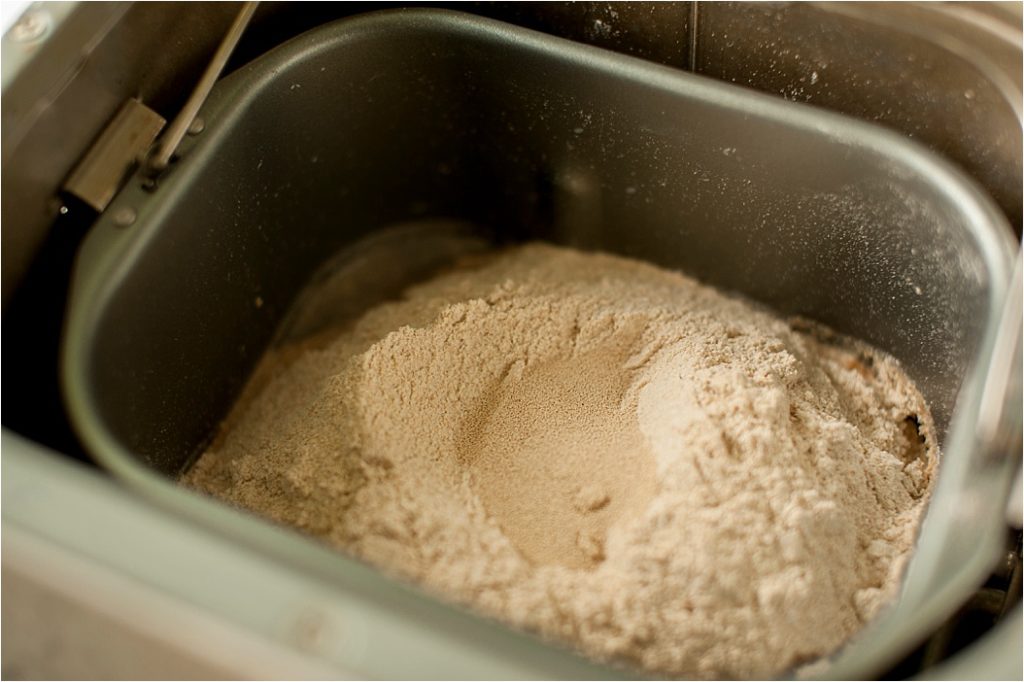
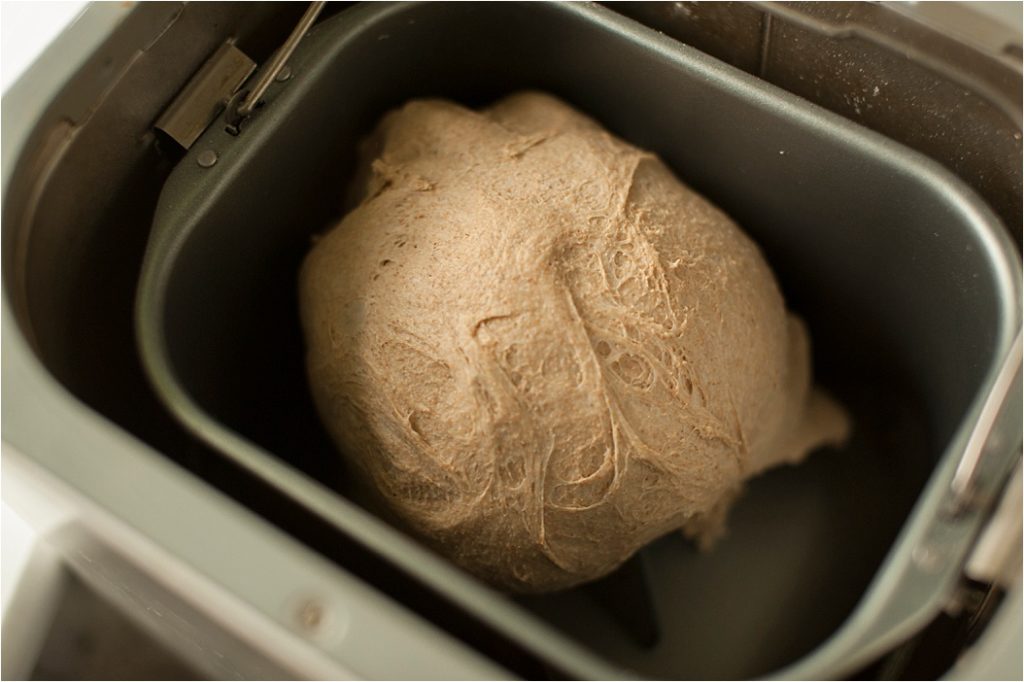
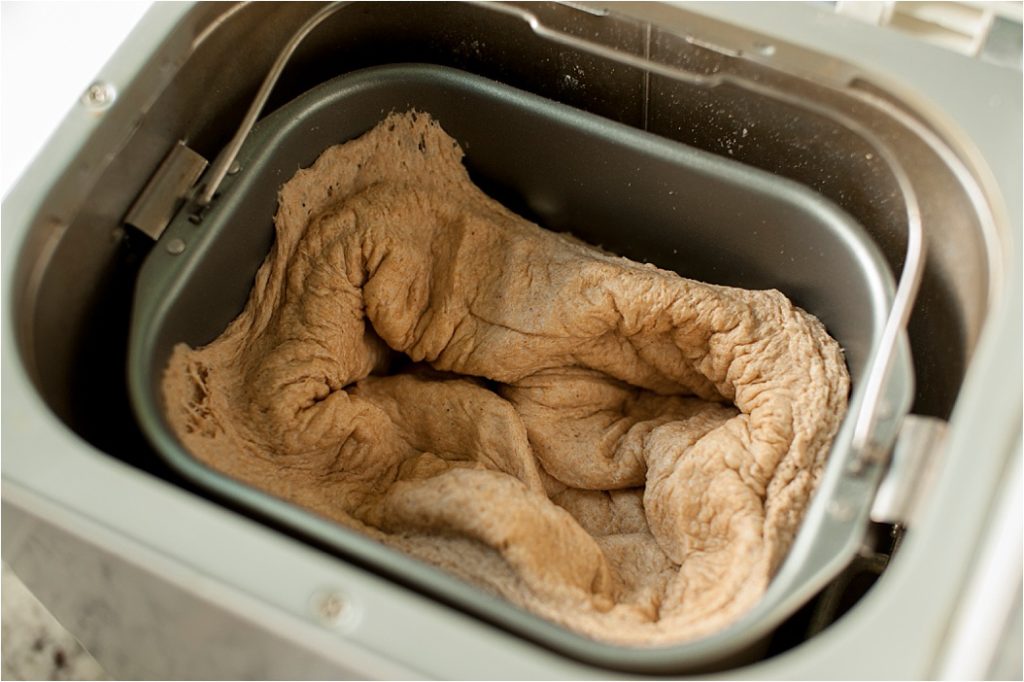
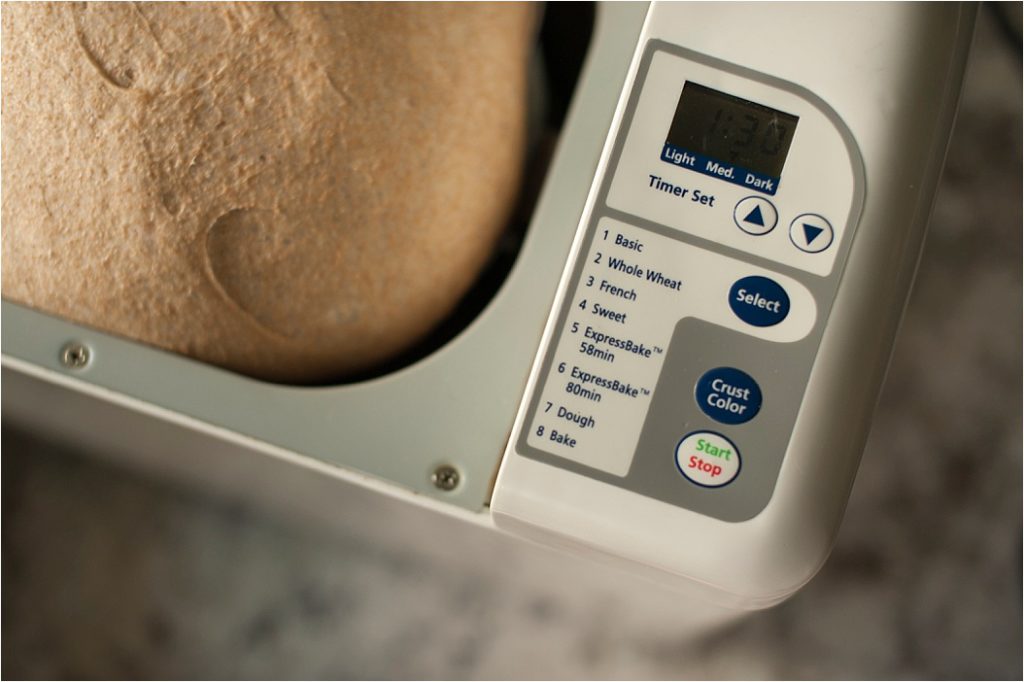
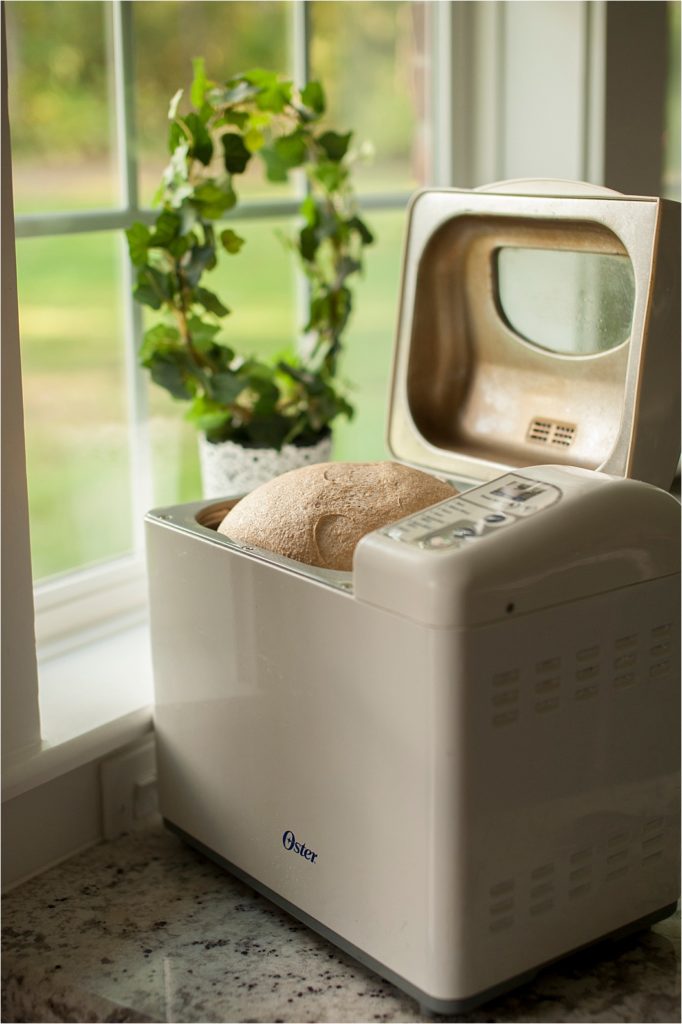
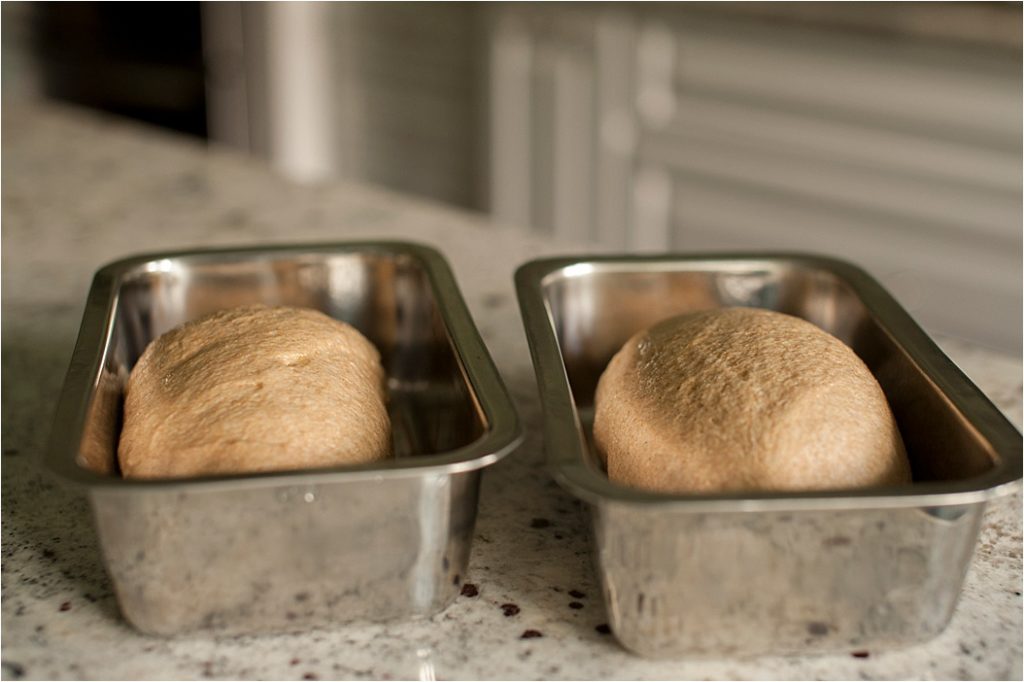
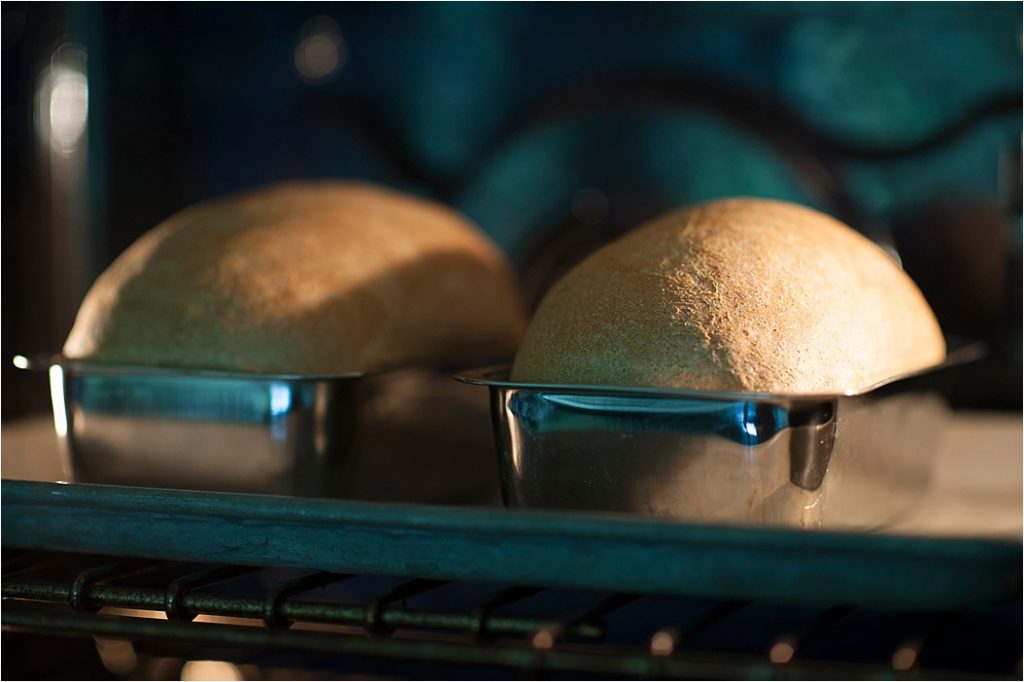 I then stick it in a warm oven (I heat my oven up until it feels like it is about 80 degrees then I turn it off) to let it rise again then I bake it.
I then stick it in a warm oven (I heat my oven up until it feels like it is about 80 degrees then I turn it off) to let it rise again then I bake it.
It is as easy as that!!! Takes me only about 5 minutes of active time and yields two gorgeous and steaming loaves of healthy bread! Honey is not typically considered on plan, but I greatly reduced the amount of honey from my original bread recipe when I was THM-ifying it to only use one Tablespoon. When you spread that out between the two loaves that this recipe makes the amount of honey is so miniscule that is considered on plan. Rest assured, a THM admin has looked over this recipe and it is indeed on plan. My family agrees that this bread is far superior to my original recipe and I hope you will enjoy it as much as we do!
PIN IT!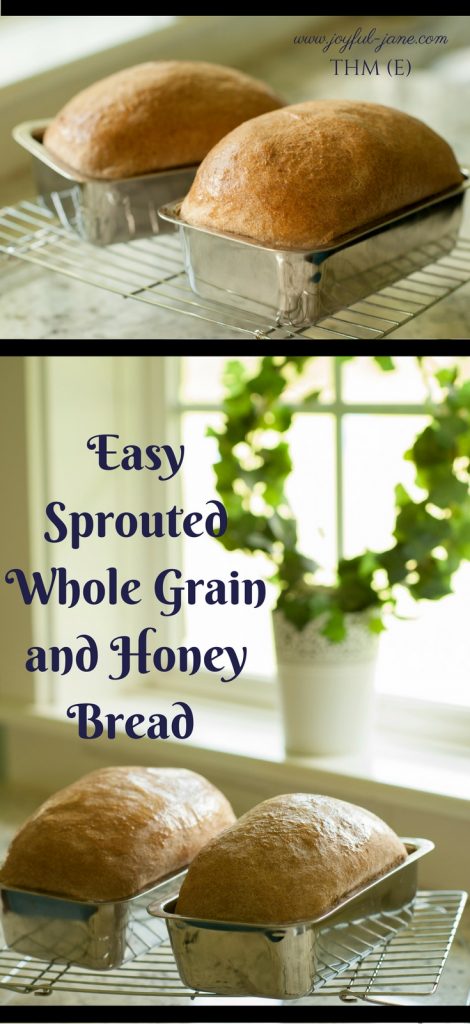
Easy Sprouted Whole Grain and Honey Bread
THM (E)
2 cups plus 2 Tablespoons warm water (see recipe note above if using ALL sprouted flour in this recipe)
2 Tablespoons butter, softened
1 Tablespoon honey
2 teaspoons salt
3 2/3 cups organic sprouted whole wheat flour (See NOTE above about my new flour recommendation. I recommend the “To Your Health” brand of Sprouted White Wheat on Amazon or you can save money and buy the Red Sprouted Whole Wheat “One Degree” brand at Sprouts Grocery Store or on Amazon)
1/3 cup un-sprouted whole wheat flour (this ingredient is not typically on plan with THM, but has been given the “OK” from a THM admin in this recipe–see notes above about the new and improved recipe details)
2/3 cup unbleached white flour (this ingredient is not typically on plan with THM, but has been given the “OK” from a THM admin in this recipe-see notes above about the new and improved recipe details)
1/4 cup Vital Wheat Gluten (This is the brand I use and recommend)
1 Tablespoon SAF Instant yeast (It is important to use THIS brand of yeast for best rising)
(NOTE-This bread can also be made with ALL sprouted flour instead of adding the white and un-sprouted whole wheat flours if you use the “To Your Health” brand that I talk about in the detailed NOTE above.)
Kristen’s Easy Bread Machine Method-
1. Put water, softened butter, honey and salt into a 2 lb. loaf capacity bread machine pan.
2. Measure flours and Vital Wheat Gluten; leveling off with the back of a knife and pour on top of liquid mixture.
3. With your finger, make a well in the flour and pour yeast into well; making sure the yeast does not touch the liquid mixture.
4. Turn machine onto “Dough Cycle”. Watch dough occasionally as it starts to form into a ball; scraping down sides of pan with a rubber spatula if needed. Depending on the stickiness of the dough, you may need to add a bit more water to ensure that a nice round ball is formed, but it may not be necessary. Be SURE that the dough is slightly sticky, but still forming a ball—slightly sticky is a good thing—it will help your bread be fluffier, rise better and have a better consistency after it is baked. You don’t want the dough ball to be too hard.
5. When the dough cycle is complete, punch down the dough. Shape the dough into two loaves, turn the loaf over and dip it into the greased pan so that you can get a small coating of oil on top of the bread dough (you can spread it around with your hand after you dip it-will help it stay moist and rise well) place dough into two greased 8×4 inch loaf pans.
6. Warm oven to about 80, then turn oven off. Place bread into the oven for 30 minutes to rise.
7. Carefully remove bread from oven and preheat oven to 350. When preheated, place bread back into oven to bake for 27-30 minutes (I like to place my bread pans on top of a cookie sheet while baking to help prevent the bottom crust from getting too dark, but this is optional)
8. Place bread onto cooling rack and lightly butter tops of loaves (may omit this step if desired, it just helps the crust be softer) before removing from the pan (you may need to run a knife around the edges of the pan to prevent the bread from sticking). Once cool, this bread can be stored at room temperature in a container or zip top bag for several days or it can last longer if placed in the refrigerator.
Notes: The amount of steps in this recipe is deceiving…Once you get the hang of it, the active time is only about 5 minutes! Simply follow steps 1-3 to make this bread solely in the bread machine on the “Whole Wheat” setting if desired, but the texture and the crust are not as desirable that way. If you prefer a sweeter bread (remember, I had to reduce the amount of honey from my original bread recipe so that it could be on plan) then you can try making it by adding one Tbs. of the THM Sweet Blend to give it a bit more sweetness. I have made it this way, but it is not necessary, only personal preference.
Mixer Method–
1. Put warm water, yeast, softened butter, honey and salt into a mixer bowl (such as a Kitchen Aid or Bosch mixer) with a dough hook attachment. Let it sit for 5 minutes while the yeast proofs and starts to bubble. Add 3 cups of flour and begin mixing on slow speed. Gradually add the remaining flour until you have a nice round ball that is slightly sticky. You may have to scrape down the sides. Let the mixer knead the dough for 10 minutes. Remove the dough then place into a greased metal bowl (I like to dip the top of my dough ball into the oil to make it nice and supple for rising). Heat your oven to about 80-100 degrees then turned the oven off. Cover the bowl with a towel and place it into the warm oven and let rise for 30 minutes until doubled in size.
2. When the dough is finished rising, punch down the dough. Divide the dough in half and shape into two loaves turning the dough under to get a nice smooth top. dip the tops of the dough into the oil in the greased pan before placing it in the pans. The oil will help the dough stay moist and rise well. If you are wanting to make rolls from the dough then read all the instructions for that on THIS POST HERE .
3. Warm the oven again to about 80-100 degrees, then turn oven off. Place loaves into the warm oven for 30 minutes to rise.
4. Once risen, carefully remove the bread from the oven and preheat oven to 350. When preheated, place bread back into oven on the middle rack to bake for about 27-30 minutes, depending on how fast and hot your oven cooks.
Yield: Approximately two loaves of bread (or two dozen rolls or one pan of rolls and one loaf of bread-be sure and read the details and baking times for rolls on this post HERE.
These two pictures show the yeast proofing and the dough mixing.
These three pictures below show the un-risen dough before putting it in the oven to rise and then the risen dough and the punched down dough
The dough can also be made into two dozen rolls or one loaf of bread and one pan of a dozen rolls. The picture below shows the risen dough before being baked.
The sprouted bread makes wonderful sandwiches. Today I made it for lunch as a sandwich with Light Laughing Cow Cheese, turkey, tomatoes and spinach. It was yummy!
The picture below is a typical “E” lunch that I make and send with my husband to work. I keep everything separate and let him assemble it at work so it doesn’t get soggy.
Happy Baking!
Pin It!
This post contains affiliate links.


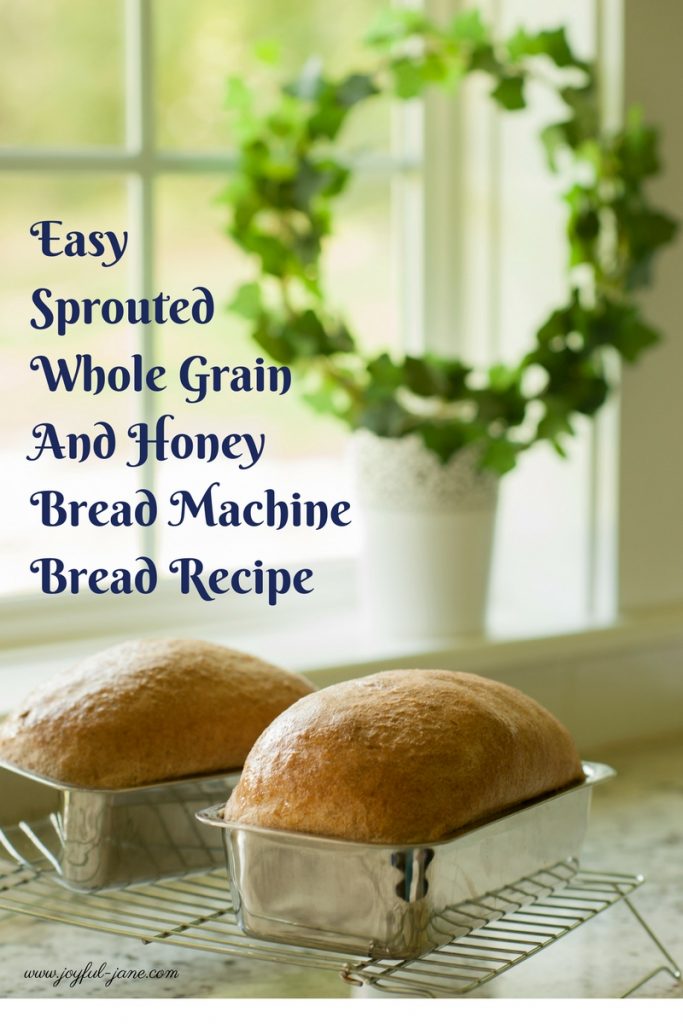

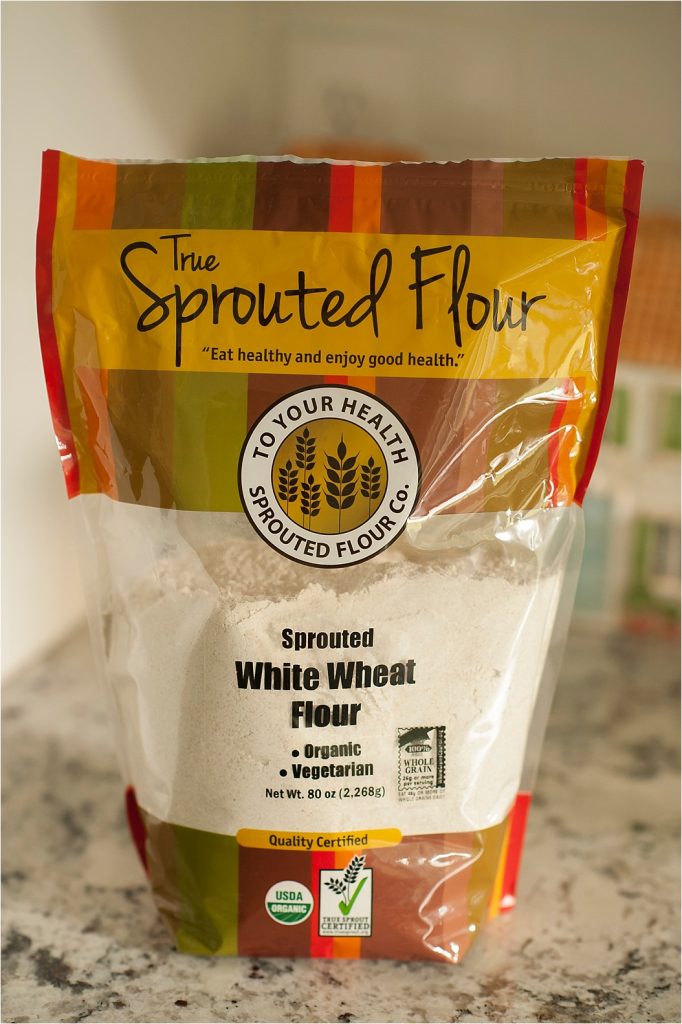
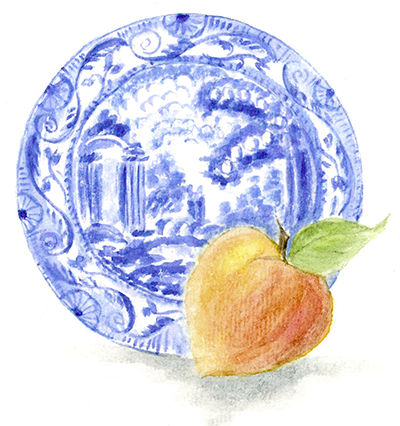
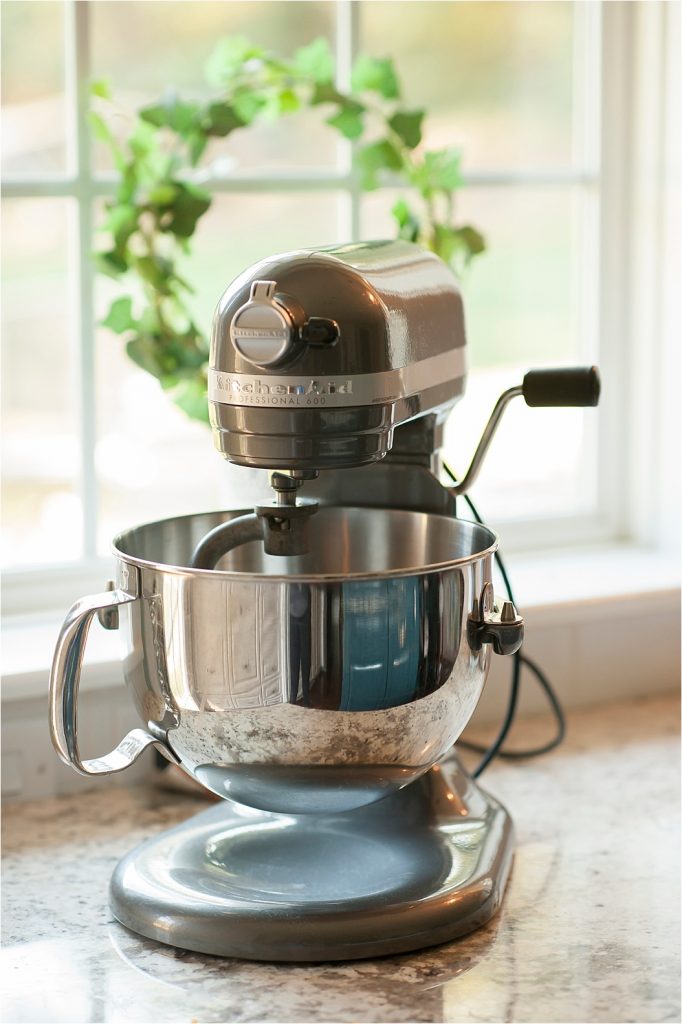

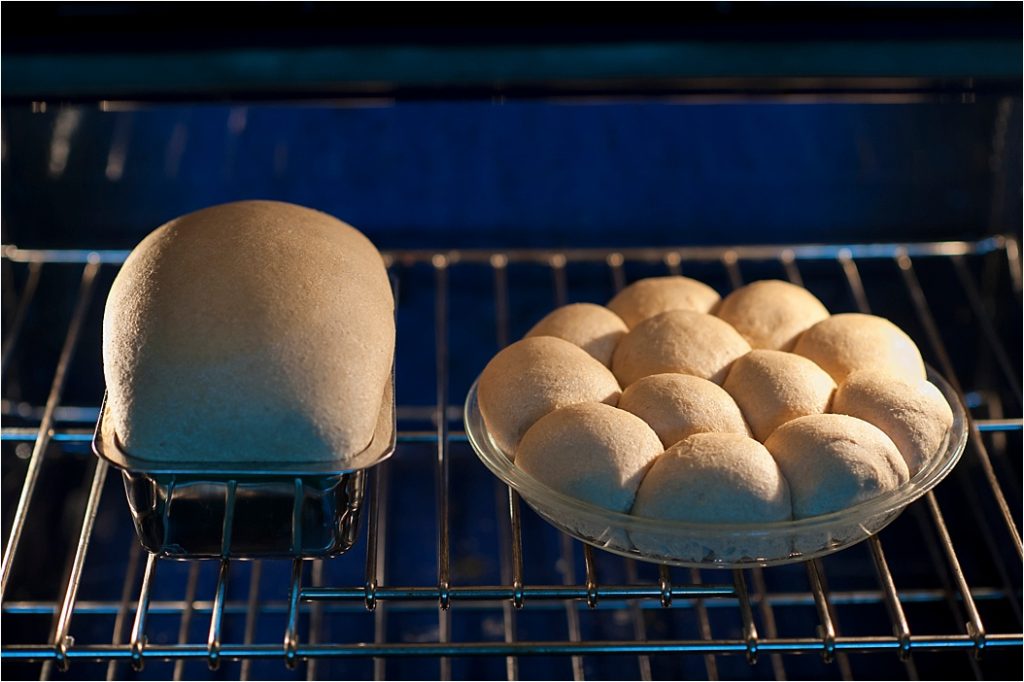
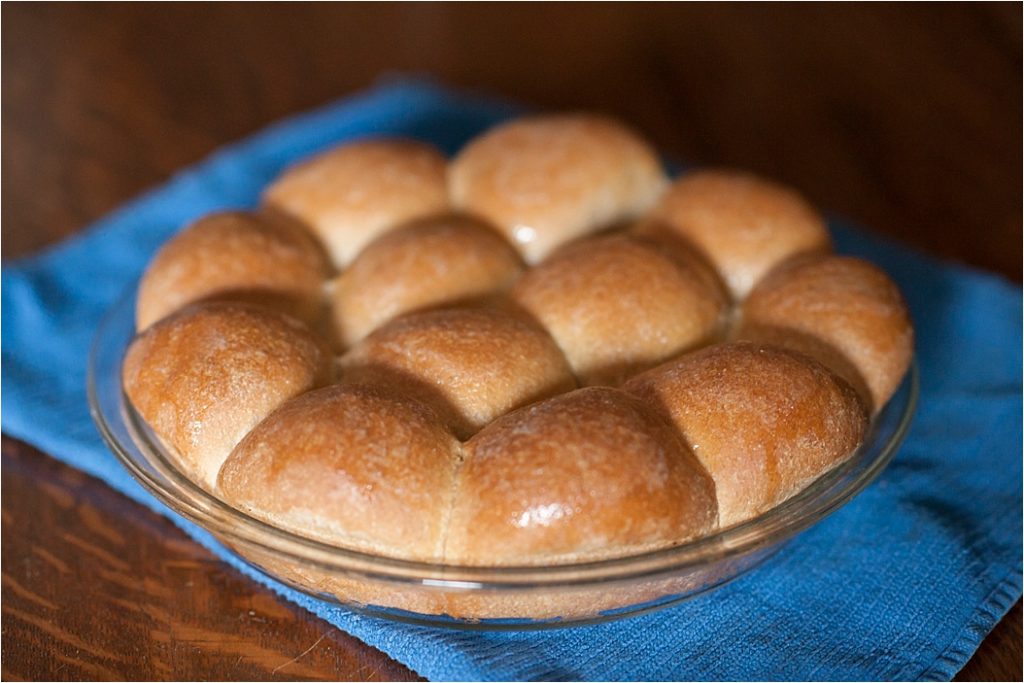
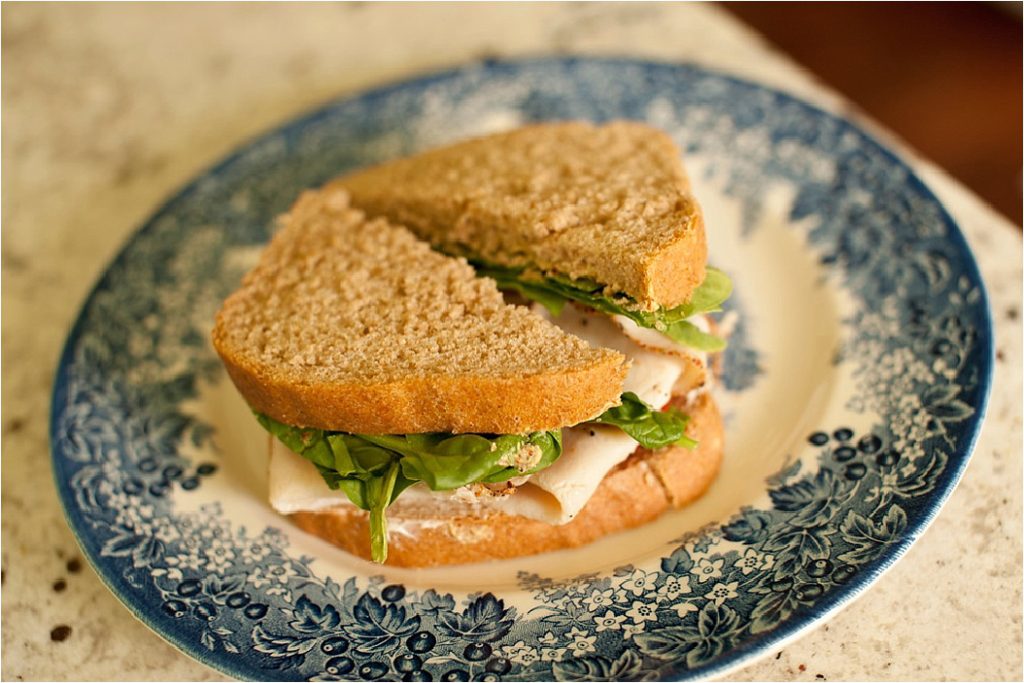
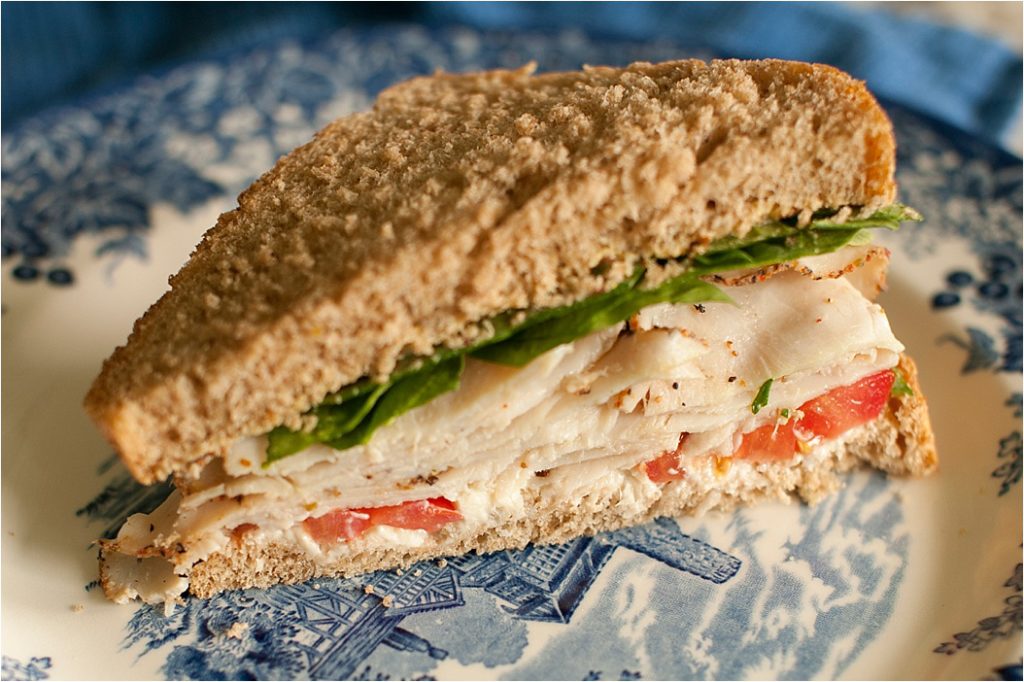
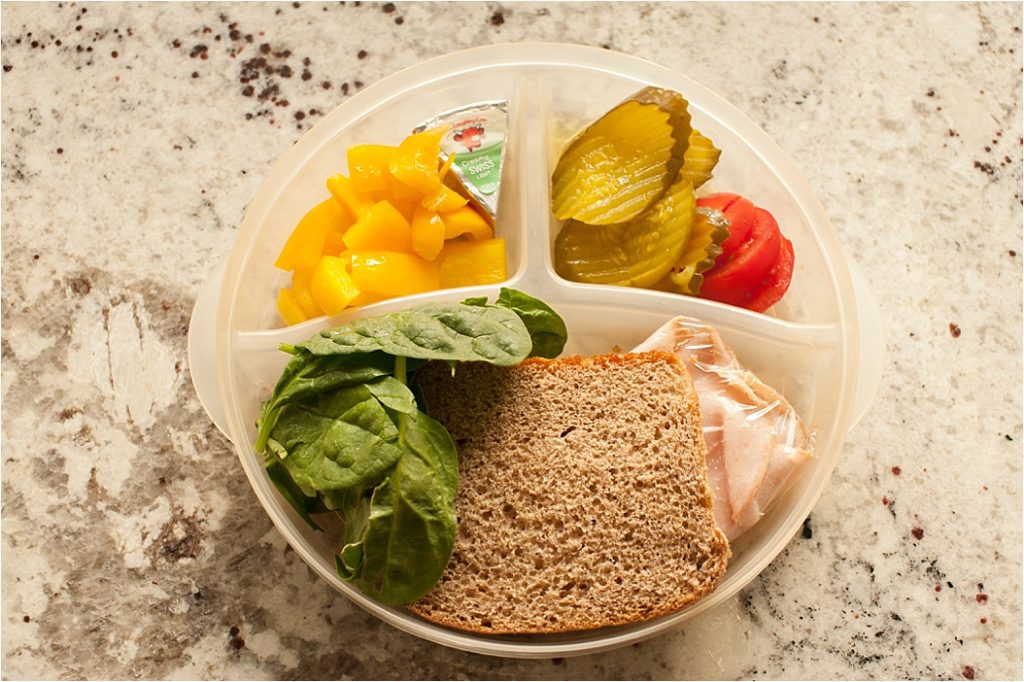




I’ve made this before and it’s delicious! However, instead of removing it from the bread machine can I allow the cycle to finish and bake it in the machine?
Thank you!
Yes, Kelly, you can leave it in the bread machine to finish the baking cycle, however the crust will be much thicker and tough and the bread will not be as light and fluffy. Plus, it will only make one loaf instead of two. =)
Hi, if I want to make this bread using only sprouted flour how much sprouted flour do I need? Thank you
Hi Jamie!
If you want to make it with all sprouted flour you can use 4 2/3 cups sprouted flour, but you may need to increase your water by about 2 tablespoons to make sure your dough is nice and soft. =)
I don’t have a bread machine; can I still make this bread?
Yes, you can easily make this bread recipe in a mixer or by hand. Enjoy!
Hi, thank you so much for this recipe.
I don’t have regular whole wheat flour, so would I need to add anything if I use 1 cup of white AP flour when eliminating the whole wheat flour?
You shouldn’t need to add anything at all if you sub the WW for AP.
Thanks for this recipe. I can’t wait to try it. Also, I LOVE your dishes. I have those
too! 🙂
Thank you! I love our dishes, too! We’ve had them since we got married! =)
I’m researching for the lowest cost on the flour. I saw on your post that someone originally purchased yours for $6.99/5 lb bag but what I’m seeing is almost $6 for only a 32 oz bag. I actually found the green packaging on Amazon but its almost $15 for 5 lbs. Can you please share where you get yours and the cost.
Leah Ann, my sister-in-law buys the sprouted flour for me at Sprouts Grocery Store in Houston for about $6ish a bag. She buys a lot at a time to help me stock up since we don’t have a Sprouts store where I live.
We LOVE this bread! Easy recipe and will be making it weekly for my husband an I. Even my grandkids will enjoy it. On the THM plan can you have one slice in an S setting like you can with Ezekiel bread? Thank you so much for sharing this recipe.
Yay! I’m so glad you love the bread! For THM, if you eat one slice of this bread with an S meal it would be considered an S Helper. For an E or Crossover meal you can have two slices.
Hey Kristen, are you using standard size loaf pans? Like 5×9.5 size?
Stacie, I believe my pans are more like 4×8.
Just made this bread for the first time tonight. AWESOME!!!! I LOVE it!!! I’m a fanatical bread maker and had to give up bread-making when I started THM in April. Now I can make it again!! I’m so excited! Thank you!!!
Yay! I’m so glad Angela! =)
Thank you for sharing. Could other nuts and grains be added to this bread? We like a slight crunch!
Hi Jeanie! I haven’t tried adding nuts or other grains to the bread, but I don’t see why adding a little bit wouldn’t work. I would caution you about adding too many nuts if you want to keep this as an E bread. The added fat in the nuts would probably make it into a Crossover for THM. Otherwise, go for it and let me know how it turns out! =)
What kind of salt do you use?
I’ve used different kinds of salt Ashley. Sometimes I use the THM Mineral Salt and other times I may use Iodized Sea Salt.
The best prices I can find for the “to your health” look like a loaf would cost over $4 in flour alone. Do you know of any better options?
I am not sure Ashley-since I first wrote this post I see that the To Your Health Company has increased their prices. However, if you make the version of my recipe that uses the One Degree Brand and the mixture of regular whole wheat and white flour then you can make it much more affordably.
Have you tried Einkorn sprouted flour? I see that it naturally has less starch than regular wheat.
Ruth Ann-I haven’t tried the Eincorn sprouted flour yet. If you try it let me know how it turns out!